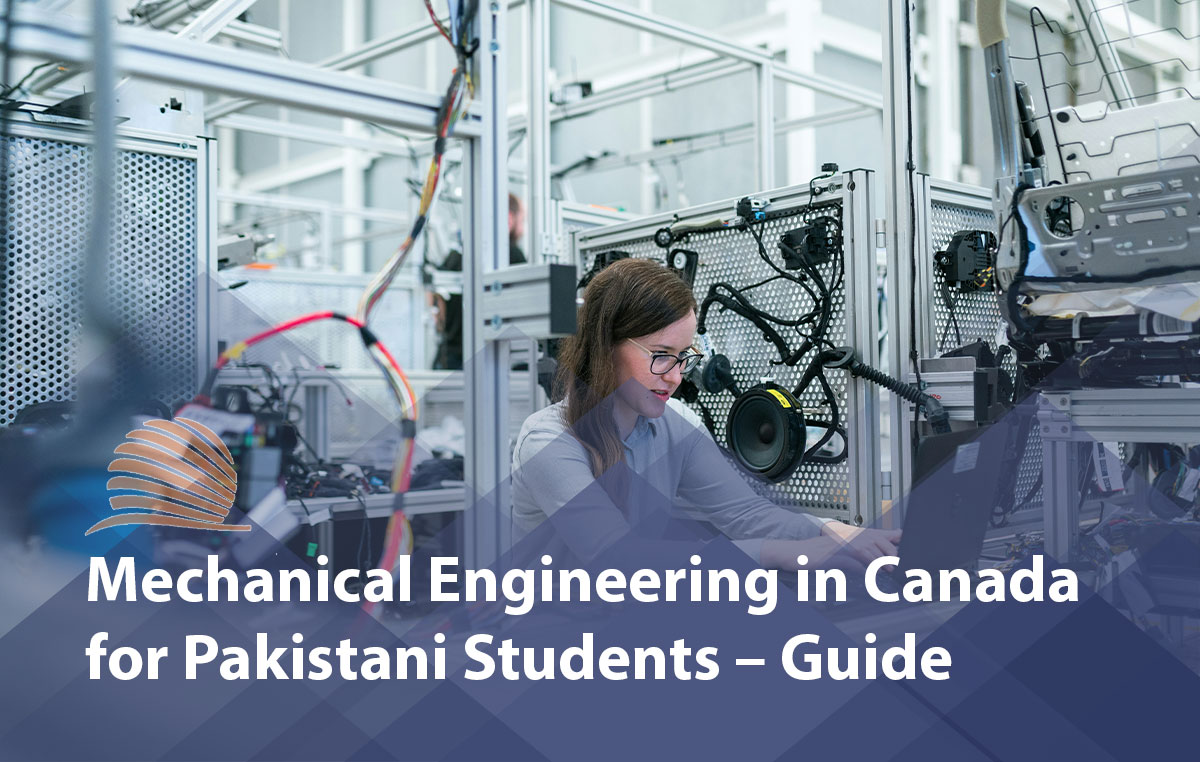Mechanical Engineering in Canada

Study abroad expert advice
Don't waste time! just fill the form to get help.
Mechanical engineering is a popular discipline in Canada, and it provides good educational and employment prospects for Pakistani students. Over 15,000 job openings in Canada demonstrate the growing demand for skilled mechanical engineers, as does a shortage of qualified professionals, producing a positive job market for graduates. Mechanical engineering programs at Canadian universities are comprehensive, focusing on applied sciences, modern technology, and real-world problem solving, with co-op placements available to help students obtain useful work experience while studying. Admission normally requires good academic performance in science and mathematics, as well as proof of English ability. Graduates benefit from Canada's welcoming atmosphere, multicultural society, and pathways to permanent residency, making it an appealing location for Pakistani students looking for a great engineering education and long-term employment opportunities.
Why Study Mechanical Engineering in Canada?
- World-class Education: Canada has top-tier universities with superb mechanical engineering programs, cutting-edge research facilities, and a diverse choice of specializations.
- Career opportunities: Graduates have access to a strong job market, competitive salaries, and internship/co-op opportunities.
- Diverse Specialization: Students can pursue diverse specializations such as robotics, aerospace, automotive engineering, energy systems, and sustainable technology.
- Quality of Life: Canada offers a safe and cosmopolitan environment with favorable immigration policies for international students and graduates.
- Post Graduate Job Permit: The Post-Graduation Job Permit (PGWP) allows overseas students to gain valuable work experience in Canada after graduation, enhancing their career chances.
Top Universities for Mechanical Engineering in Canada
| University Name | QS Subject Ranking 2025 | Approx. Tuition Fees (CAD/year) |
|---|---|---|
| University of Toronto | #14 | 40,000 – 60,000 |
| University of British Columbia | #22 | 39,000 – 55,000 |
| University of Waterloo | #27 | 35,000 – 50,000 |
| McGill University | #35 | 30,000 – 45,000 |
| University of Alberta | #50 | 25,000 – 40,000 |
| McMaster University | #60 | 28,000 – 42,000 |
Admission Requirements
For Bachelor’s Programs
• Academic Background: 12 years of schooling with outstanding grades in Physics, Chemistry, and Mathematics (minimum of 60%).
• Standardized tests: Some institutions need SAT or ACT scores, while others may not.
• English proficiency level: IELTS 6.5-7.0 or TOEFL 80-100.
• Required documents include academic transcripts, letters of recommendation, and statement of purpose, CV/resume, passport copy, and evidence of funding.
For Master’s Programs
• Academic requirements: Bachelor's degree in mechanical engineering or comparable discipline with a minimum GPA of 3.0-3.5 on a 4.0 scale.
• Standardized tests: Some universities may require GRE scores.
• English proficiency: IELTS 6.5 or TOEFL 80-100.
• Required documents include academic transcripts, GRE/English test scores, letters of recommendation, statement of purpose, CV/resume, and proof of financial support.
Application Process
• Research universities and compare their rankings, tuition rates, course content, and location.
• Prepare for mandatory standardized tests, such as IELTS, TOEFL, GRE, SAT, or ACT.
• Gather documents, including academic transcripts, test scores, SOP, LORs, CV, passport, and financial proof.
• Apply Online: Submit your application online using university portals.
• Interviews: Certain programs may demand these.
• Receive Offer: Accepted applicants will receive admission letters.
• Study Permit Application: To apply for a Canadian study permit, including your admission letter and financial documentation.
• Plan travel and enrollment, including lodging, airfare, and orientation.
Student Visa Requirements
- Visa Type: Canadian Study Permit.
- Documents Required: Admission letter, proof of financial support, passport, visa application form, photos, and biometrics.
- Interview: May be required at the Canadian visa office.
- Additional: Medical exams and police clearance certificates might be necessary.
- Visa type: Canadian Study Permit.
- Documents required: Admission letter, proof of financial support, passport, visa application form, photographs, and biometrics.
- Interviews: May be required at the Canadian visa office.
- Additional: Medical tests and police clearance certificates may be necessary.
Costs: Tuition and Living Expenses
| Expense Type | Estimated Annual Cost (CAD) |
|---|---|
| Tuition (Undergrad) | 25,000 – 60,000 |
| Tuition (Graduate) | 20,000 – 50,000 |
| Living Expenses | 10,000 – 15,000 |
| Health Insurance | 600 – 1,000 |
| Books/Materials | 1,000 – 2,000 |
| Miscellaneous | 2,000+ |
Scholarships and Financial Aid
- Many Canadian universities offer merit-based scholarships and bursaries for international students.
- External scholarships include the Vanier Canada Graduate Scholarships and provincial awards.
- Canadian government and private organizations also provide financial aid opportunities.
- Early application and meeting eligibility criteria are crucial due to high competition.
- A lot of Canadian institutions give scholarships and bursaries to international students who have good grades.
- Outside scholarships, like the Vanier Canada Graduate Scholarships and awards from provinces, are also out there.
- The Canadian government and some private groups also offer ways to help pay for school.
- It's really important to apply early and be sure you qualify, because a lot of people are trying to get these scholarships.
FAQs
What are the requirements for getting into a bachelor’s program?
You'll need to have finished 12 years of schooling. Good grades in science and math are a must. You also have to prove you know English well (with an IELTS score of 6.5-7.0 or a TOEFL score of 80-100). Don't forget to include things like your school records and recommendation letters.
What do I need to study Mechanical Engineering for a master’s?
You should have a bachelor’s degree in a similar field, with a GPA of 3.0 or higher. You might need GRE scores (it changes from school to school). Showing you're good at English is required, along with documents like your personal statement and letters of recommendation.
Do I need job experience to get into a master’s program?
Usually, job experience isn't a must, but it can help your application for some programs.
When do I usually have to apply for programs?
If you’re starting in the fall (September), the deadline is usually around May 1 to June 1. For winter (January) and summer (May) starts, it depends, but it's usually a few months before.
What kind of visa do foreign students require?
You'll need a Canadian Study Permit if you're planning to study full-time. This covers both your classes and any internships.
Are there scholarships for students from other countries?
Yes, many colleges in Canada and other groups have scholarships for good students or those who need money.
Can I hold a job when studying in Canada?
If you're an international student, you can work up to 20 hours a week during school and full-time when you're on holiday.
What are some popular things to specialize in, in Canada?
Popular areas include computer-based engineering, machine design, how fluids work, mechatronics, and atomic power.
How long does it take to get a mechanical engineering degree?
A bachelor’s usually takes 3-4 years. Master’s programs are around 1.5-2 years, varying on how many classes you take and where you study.
What level of English do I need to know?
You'll often need an IELTS score of at least 6.0-6.5 or a TOEFL score of 79-100, but it depends on the school.


.jpg)

